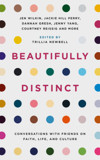
Evangelistic testimony telling is just telling folks about your encounter with Jesus. Any encounter with Jesus.
This doesn’t have to be your whole life story or the story of how you came to faith. It doesn’t have to be super-complicated. It’s a matter of discerning the relationships that you have, the conversations that you have, and finding little ways to talk about Jesus. It could be “Last week I had anxiety, but I cast my cares on him because he cares for me, and now I have peace.” Though small, it is still your story.
Talking about how Jesus met you when you were feeling overwhelmed is just as glorifying and powerful, and able to be used by the Holy Spirit as the telling of your conversion would be. Any story can be the starting point for telling his story too.
Right now a lot of people are turning away from or changing their beliefs, not based on theology but based on compelling narratives that they’ve heard. Stories are literally shaping the way people think about God and sex and sin and money.
"When it is stories that are leading people away from God and away from his word, it is important for Christians to have a counter-narrative that will invite them back."
While you may be able to discuss theology with a person who disagrees with you—and you should—it’s a hard thing to argue with someone else’s experience and someone else’s story because everybody connects to pain and triumph, fear and courage, so when we listen to narratives about these things, we are prone to letting them shape the way we think.
When it is stories that are leading people away from God and away from his word, it is important for Christians to have a counter-narrative that will invite them back. And each of us has a story—each of us has countless stories—that can be that counter-narrative.
Let me explain by telling you my story and how I’ve told it. In the end it is not just my story but the story of Jesus and the good news of the gospel.
My story begins with me realizing when I was six or seven that I had same-sex desires. I didn’t know the name for it. It just was a feeling, something that I noticed in myself. It was when I went to church that I realized “This is homosexuality, and it seems like Christians don’t like it too much.”
It was at high school that I decided that being a heterosexual was harder than just acting out on what I thought myself to be. So I became a lesbian, and I enjoyed it. It felt natural. It felt freeing. It felt like a better option for love.

Inspires women to engage with life and culture in a God-honouring way.
And then, when I was 19, God spoke to my heart. He showed me that his concern was not only my sexuality but my whole life. Christians had talked to me as if homosexuality was the only thing God wanted me to repent of. But through his Spirit he showed me: No, Jackie, your whole heart is problematic.
I saw that Jesus had to be the worthy one and the good one. And by his grace I chose him, and now I’m different.
Different as in freed from the power of sin (Romans 6:22) and able to live for and love God. This was and is the hope of everyone who believes, gay or straight: that the God who will make all things new has come to do that in us.
That’s my story, as far as it can be told in a few paragraphs. That’s the story I’ve told again and again, and in one way it’s your story too: By his grace, now I’m different.
"Telling stories gets across the fact that the gospel doesn’t just save you but changes you daily."
I think the assumption by people in our culture is often that Christians don’t struggle—that Christians just have a very easy life. You know how this assumption goes: our kids are well behaved, our marriages are all great, and we don’t struggle with pornography or lust or greed or all these other things that drag people down, and that in fact do drag Christians down too sometimes.
And so actually to tell the stories of what happened yesterday and the stories of what happened last week allows us to speak more honestly and authentically about our experience of everyday life and its struggles. “I didn’t trust God about this, but I trust him now.”
Faith is practical and renewed every day. We are trusting God on Tuesday, Wednesday, and Thursday in the same way that we trusted him ten years ago when we got on our knees for the first time and said, “God, forgive me.”
Telling stories gets across the fact that the gospel doesn’t just save you but changes you daily.
People need to be able to see that the gospel works. They don’t just want to hear “Jesus is good”; they want to see if his goodness has reached down into how we live our lives. They need to know that God can change them. That is what every Christian story can demonstrate.
Now I’m different.
Whether that’s different than ten years ago or different than this morning, it gives people real hope.
This article is an adapted excerpt from Beautifully Distinct, a book by godly, clear-thinking women about a range of areas of life and culture. The book, edited by Trillia Newbell, helps us to be thoughtful about films, books, and the media; sets out biblical principles for approaching topics such as body image and racism; and encourages us to shape the world around us for Christ—becoming beautifully distinct.